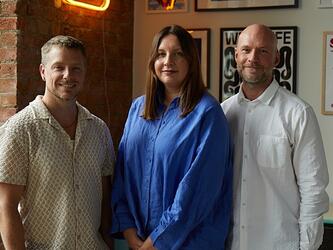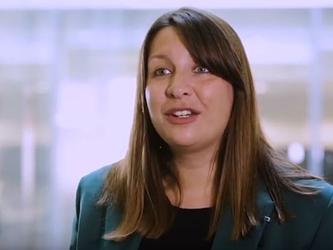Kathryn Blanshard – momentum is better than perfection
What do you think will be your biggest challenge leading the UK business?
Keeping up the momentum; 2017 was a great year for us. We won the Best Agency at the MRS Awards and the business has been steadily growing. But we can’t rest on our laurels – we need to get closer to our clients, listen for opportunities for reinvention and not stand still.
In addition, looming in the distance are fears about the implications of Brexit on top talent. We’re very proud in London that 80% of our work is global and 40% of our office speaks more than one language. That’s a tradition that we will keep but I’m sure there will be challenges along the way.
You're taking over while C Space is undergoing its business transformation (customer inspired growth) – how will that affect your role?
We’ve laid the foundations and the next few years are about really living it. This involves pushing our diverse methods as a customer agency, getting clients closer to their customers and delivering even better work. We need to keep proving that brands that work in a more customer inspired way will be more profitable.
You have worked at C Space since its Promise days, what have been the biggest changes you've witnessed in the insight world since 2010?
In 2009, BCG released a study stating that too many insight departments were stuck in an ‘order taking box’ and struggled to be a source of competitive advantage for their businesses, recognised at the C Suite level.
In many ways, the biggest change I’ve seen is the rise in influence of the insight department in so many organisations. Seeing brands appoint chief customer officers to the board has been an amazing shift. But we still have a long way to go and I think influence is a key issue for the industry. Both clients and agencies need to work together to keep doing amazing work and landing it, to prove the value to management.
We're constantly told how much threat market research is under with the rise of automation, self-serve, machine learning and budget cuts – how do you see agencies in this space surviving and thriving within that context?
Agencies are – and always will be – about people and relationships. At C Space, one of our mantras is ‘relationships are the source of results’.
We need to ensure that we are focusing more than ever on creating great relationships with our clients that deliver them genuine value. That’s about being fascinated by their businesses and making a difference. And, we should embrace automation in the right way to help with that. I’m all for automation that frees people up to spend more time thinking about the challenge they’re working on and deliver a better result.
If clients want to be more hands-on and collaborative, that works too. The key is that we’re adding value in the right places by really listening to client’s needs. I think if we do that, agencies will continue to thrive.
C Space’s positioning is all about putting the customer at the centre of business strategy – do you think the changes in communications brought about by the internet and mobile has made this easier or harder for businesses to achieve?
I think it’s made it easier and more complex at the same time.
Being able to use technology to get closer to customers through communities, social listening, big data…it’s an amazing resource. But you must apply the right filters to get you true insight because the sources of insight and customer are boundless – both inside and outside your organisation.
Just as important as the actual insight is landing the insight within a business. An insight is only as good as the difference it makes. And businesses are inundated with insight. We like to think of ourselves not just as consultants but as the ‘advertising agency to the insight department’ working with our creative team. This need for better insight mining and communication is why I think agencies are still so critical to brands, even with the advance of automation.
Why does it take one women to do the job of two men [Blanshard is replacing Phil Burgess and Felix Koch]?
Wow, quite the question and not one that I feel is driven by gender!
When Felix and Phil took the job a few years ago, co-leadership was the right thing for the business. We were going through a big period of transformation and their complimentary styles (and bandwidth) allowed them to get really close to the business and make change fast, together.
Today, we are in a very different place. We have a new brand, a new set of company behaviours, a renewed work ethic and promise. Our leadership felt that having one MD is right for the phase we’re in.
I think it’s great to be able to flex our model according to the needs of the business. Who knows, co-leadership could be something we try again in the future.
With gender equality in the workplace finally being talked about more seriously, what do you think are the most important and effective ways a business can ensure it promotes gender – and broader – diversity?
By doing.
The most important thing is that agency leadership (women AND men together) identify what needs to be done and start somewhere. Momentum is better than perfection. In the past year, we’ve made a lot of strides in partnership with our HR and talent team in the UK – launching blinded CVs, an apprenticeship programme and revamping our parental policies – all from this mentality of getting on and doing it.
Crucially, this year we aligned on what we wanted to do and stopped talking about it but rather empowered our team to go out and do it.

We hope you enjoyed this article.
Research Live is published by MRS.
The Market Research Society (MRS) exists to promote and protect the research sector, showcasing how research delivers impact for businesses and government.
Members of MRS enjoy many benefits including tailoured policy guidance, discounts on training and conferences, and access to member-only content.
For example, there's an archive of winning case studies from over a decade of MRS Awards.
Find out more about the benefits of joining MRS here.














0 Comments